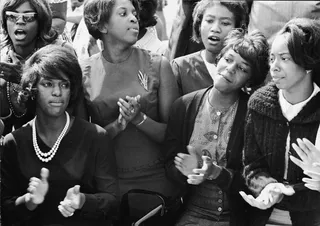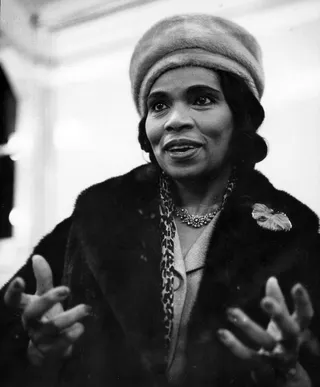Women of The March on Washington
Dorothy Height, plus more female civil rights activists.

1 / 13
Women Played a Crucial Role - During the 1960s women endured the toils of the civil rights movement alongside men. But with no female speakers at the March of Washington in 1963, they were left in the shadows of the most prolific march of their time. BET.com takes a look at the women who worked to make the march a success and the women who will speak at the National Action to Realize the Dream to commemorate the 50th anniversary of the great march. — LaToya Bowlah(Photo: Express Newspapers/L360/Getty Images)
Photo By Express Newspapers/L360/Getty Images

2 / 13
Myrlie Evers-Williams - Myrlie Evers-Williams appeared on the program for the 1963 March on Washington, but she was unable to attend. She was a chairwoman of the NAACP and worked during the civil rights movement to seek justice for the murder of her husband, Medgar Evers. Evers-Williams is slated to speak on Saturday. (Photo: Justin Sullivan/Getty Images)

3 / 13
Anna Arnold Hedgeman - In 1963 Anna Arnold Hedgeman joined the staff of the Commission on Religion and Race of the National Council of Churches, which mobilizes resources to combat racial injustice. While working with the commission, Hedgeman recruited over 40,000 Protestants, who marched on Aug. 28. She later became the first Black woman to be a member of a mayoral cabinet in New York City. (Photo: Courtesy of Hamline University)

4 / 13
Dorothy Height - Dorothy Height, the only woman who worked alongside the “Big Six” of the civil rights movement, is regarded as the unheralded seventh leader. In 1963 she headed the National Council of Negro Women and worked as one of the march’s chief organizers and orators. During Martin Luther King Jr.'s “I Have a Dream” speech, Height sat on the stage, arm’s length from King, but was not asked to speak. (Photo: The Washington Post via Getty Images)

5 / 13
Daisy Bates - Daisy Bates was the president of the Arkansas chapter of the NAACP. In 1957, she helped nine African-American students, who became known as the Little Rock Nine, to become the first to attend the all-white Central High School in Little Rock. During the 1963 march, Bates was assigned to walk with the wives of the civil rights leaders, far out of any camera's view. (Photo: New York Times Co./Getty Images)
ADVERTISEMENT

6 / 13
Diane Nash - In the 1960s Diane Nash was the student organizer responsible for the Freedom Riders in the South and played a key role in bringing Martin Luther King Jr. to support the riders in Montgomery, Alabama. She organized buses of Freedom Riders to attend the March on Washington. Then in 1964 she was appointed by President Kennedy to the national committee promoting passage of the Civil Rights Act. (Photo: Leigh Vogel/Getty Images)

7 / 13
Bernice King - Bernice King is the daughter of Martin Luther King Jr. and Coretta Scott King. She is the CEO of the King Center in Atlanta and is among the women who will participate in a series of events starting on Aug. 21, ending with the anniversary on Aug. 28. (Photo: AP Photo/Cliff Owen)

8 / 13
Rosa Parks - Rosa Parks, who sparked the Montgomery bus boycotts, was recognized at the March on Washington as one of the "Negro Women Fighters for Freedom." (Photo: Photo12/UIG/Getty Images)

9 / 13
Pauli Murray - Pauli Murray was a lawyer and women’s rights activist who staged the first sit-in at a Washington restaurant during World War II. Murray worked closely with A. Philip Randolph, Bayard Rustin and Martin Luther King Jr., but became critical of the lack of a female presence in the leadership among civil rights groups. In 1963, she wrote to Randolph, “It is indefensible to call a national March on Washington and send out a call which contains the name of not a single woman leader." (Photo: Public Domain)

10 / 13
Mahalia Jackson - Mahalia Jackson was regarded as one of the most influential gospel singers in the world. Jackson performed “I Been Buked and I Been Scorned” before Martin Luther King Jr. gave his speech at the March on Washington for Jobs and Freedom in 1963. (Photo: Keystone/Getty Images)
ADVERTISEMENT

11 / 13
Marian Anderson - Marian Anderson was the first African-American to perform with the Metropolitan Opera in New York. She sang at the March on Washington for Jobs and Freedom in 1963. (Photo: Erich Auerbach/Getty Images)
Photo By Erich Auerbach/Getty Images

12 / 13
Nancy Pelosi - Nancy Pelosi served as the 60th Speaker of the United States House of Representatives from 2007 to 2011. She will be among the women speaking at the National Action to Realize the Dream March to commemorate the 50th anniversary of March on Washington. (Photo: Alex Wong/Getty Images)
![Sybrina Fulton on the George Zimmerman verdict: - "I was in a bit of shock. I thought surely that [George Zimmerman] would be found guilty of second-degree murder, manslaughter at the least."(Photo: Joe Burbank-Pool/Getty Images)](https://images.paramount.tech/uri/mgid:arc:imageassetref:bet.com:ae35a36b-2948-420c-a922-c588f82ed8b6?format=webp&width=320)